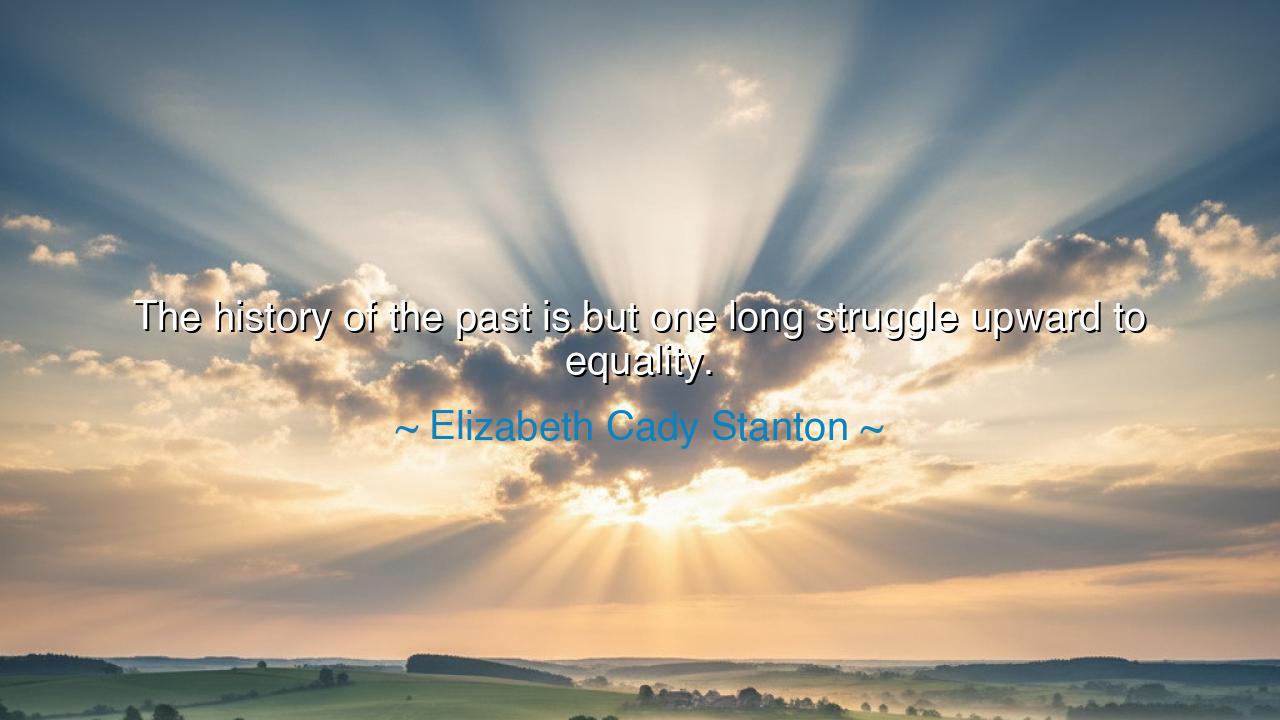
The history of the past is but one long struggle upward to






“The history of the past is but one long struggle upward to equality.” So declared Elizabeth Cady Stanton, the fearless voice of liberty and one of the great architects of women’s rights in America. Her words are not the song of triumph, but the echo of battle — the cry of generations who, beneath the weight of chains and prejudice, have lifted their gaze to the light of justice and dared to climb. In this single line, Stanton captured the beating heart of human progress: that all of history, from the dust of ancient empires to the dawn of modern nations, is the story of the soul’s ascent — from bondage toward freedom, from silence toward speech, from darkness toward equality.
Equality, in Stanton’s time, was a distant star. Born in 1815, she lived in a world that believed woman’s role was to obey, to serve, and to remain unseen. Yet within her burned the flame of the eternal truth — that no soul, man or woman, is born lesser. With courage that defied the customs of her age, she raised her voice at the Seneca Falls Convention of 1848, where she proclaimed the Declaration of Sentiments, echoing the language of the nation’s founding fathers but transforming its spirit: “All men and women are created equal.” From that bold utterance sprang a movement that would take over a century to bear its full fruit. But Stanton knew the pace of progress; she had studied history’s rhythm, and she saw that though slow, it always marched upward.
Indeed, when we look back upon the ages, we see her truth written in the struggles of every people. The slaves of Egypt rising to seek deliverance; the peasants of medieval Europe rebelling against feudal lords; the citizens of France tearing down the walls of monarchy; the black men and women of America breaking their chains beneath the banner of emancipation — each was a chapter in humanity’s unending struggle upward. The ascent has never been smooth. It has been carved by blood and tears, by rebellion and sacrifice. And yet, like a river carving stone, justice has always found its path forward.
Elizabeth Cady Stanton stood as both witness and warrior in that great current. She saw that every generation inherits the duty to climb a little higher on the mountain of equality — to fight not only for themselves but for the unborn, that they may breathe freer air. Her insight carries the wisdom of the ancients: progress is not given; it is wrested. The gods do not hand freedom to the meek; it is claimed by those whose spirits refuse to kneel. “The history of the past,” she said, because she knew that the story of the future would be written by those with the same audacity — those who dare to say, this world can be more just than it is.
Consider the tale of Nelson Mandela, who, more than a century after Stanton’s time, walked the same upward path she described. For twenty-seven years he sat in prison, a man broken in body but unbroken in will. The tyrants who bound him believed they had silenced him, but in truth, they had only given his voice an echo that would reach across the globe. When he was freed, he spoke not of vengeance but of equality — of a South Africa where black and white might walk together. He was one more climber in the long ascent of history, his struggle joined to Stanton’s, his victory born of her faith.
In the ancient sense, “struggle” is not a curse but a consecration. It is the sacred labor of the soul refining itself against injustice. Every step toward equality — whether for race, for gender, for the poor, for the voiceless — is part of a single, unbroken climb toward the divine ideal. The mountain is steep, and many have fallen upon its slopes, but each generation builds upon the stones of the last. Those who despair that the world is unjust should remember that injustice has never been the end of the story. It is the battlefield upon which the next chapter of freedom begins.
So, my child of tomorrow, when you look upon the world and see its inequalities — when you hear the cries of those still silenced or forgotten — remember Elizabeth Cady Stanton’s words. Remember that you are living in the long continuation of this sacred struggle upward. You are both heir and builder, inheritor and creator. Do not shrink from the climb; take up the torch. Speak for those who cannot. Act for those who are unseen. Each time you choose fairness over indifference, truth over comfort, courage over silence, you carry the flame one step higher.
For the summit is not yet reached. But every hand that lifts another, every voice that calls for justice, brings the world closer to its long-promised dawn — when equality will no longer be a dream of the few, but the birthright of all. That is the destiny written in the struggle of humankind, and the hope Elizabeth Cady Stanton bequeathed to the ages.






AAdministratorAdministrator
Welcome, honored guests. Please leave a comment, we will respond soon